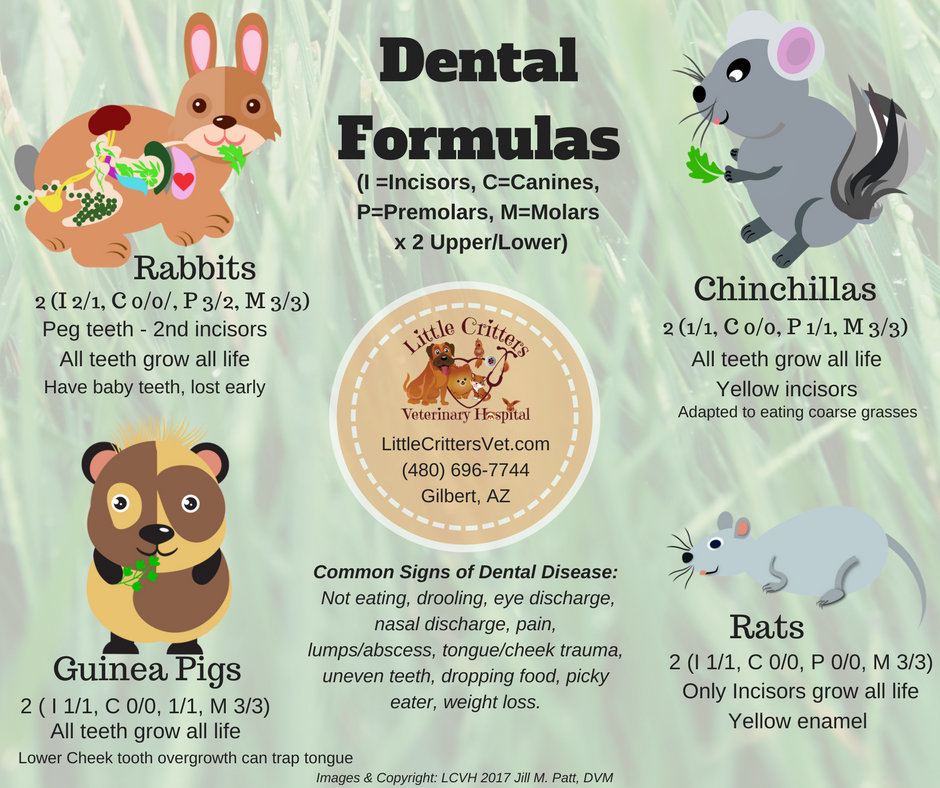|
Before considering a small mammal as a pet, please remember:
- Lifespan: The lifespans of small mammals differ, and some can live 15 years or more. Please read the Pet Care Booklet pertaining to your type of pet for more information
- Housing: For small mammals, we suggest non-wire plastic bottom cages to prevent foot/leg/toe injuries. Toys should be provided, along with a water bottle and food bowl.
- Exercise: All small mammals require regular exercise. Most small mammals thrive on being out of their cage for a period of time during the day.
- Environment and exercise: Proper environment and regular exercise are critical to your healthy pet. Lack of proper environment and exercise can lead to stress, behavioral and health problems. Handle your pet often so you can examine him or her for disease and so that it is easier for us to examine him.
- Nocturnal habits: Many small mammals have nocturnal habits, meaning they are active at night and sleep during the day. If you may be bothered by nocturnal pets or wish your pet to be active during the day, please research your pet carefully.
- Dental care: Some small mammals require dental care. Ferrets, for example, can get the same types of dental disease as dogs or cats. We recommend starting tooth brushing early in your ferret’s life to prevent periodontal disease. Other pets, such as rats and rabbits, need dental exams to be sure their teeth are not overgrown.
Caring for a small mammal includes:
Bi-Annual Exams are Necessary for Small mammals
All pets should have a bi-annual examination. The best way to keep your small pet healthy is to catch diseases early, before you’re your pet is showing any signs of illness. These pets are masters at hiding illness, so early intervention is critical. During your pet’s bi-annual examination, we may also recommend additional testing. We offer full diagnostic screening such as fecal exams, x-rays, blood tests, skin scrapings and biopsy of growths. We also offer surgeries for growth removal, fractures and internal problems. Remember that a bi-annual examination gives us important baseline records for future reference. Parasite treatment and control is an important part of your small mammal’s bi-annual exam, along with nutritional and behavioral counseling.
Spay/Neuter Surgery
Some non-breeding small mammals, such as rats, guinea pigs and sugar gliders, should be spayed or neutered. We will discuss spaying or neutering your pet during your annual wellness exam.
Following the Prescribed Diet for Your Particular Pet
Small mammals have nutritional needs and we will counsel you on the right diet for your pet. Most pets need a healthy blend of protein, fats and vegetables. Diet is extremely important and attention is need so that your pet does not become malnutritioned. Fresh water should be available to your pet at all times.
Sick Pet Care
As soon as illness is detected in your pet, please bring your pet to us for a thorough physical examination and diagnostic work-up including laboratory testing. We suggest rechecking your pet at variable intervals depending on the state of debilitation. The recheck exam allows us to assess your pet’s response to treatment and your compliance with instructions. Many times in the course of treating a small mammal the treatment must be altered somewhat to ensure the best response. These rechecks are also used as a way of reinforcing the changes needed for the pet to remain healthy. Lab values may be rechecked to ensure that your pet is truly recovering and not just feeling well enough again to resume hiding any weakness.
Learn to recognize a sick pet. It is common for the first signs to go unnoticed by the pet owner. Each pet is different, please ask us for the signs you should watch for in your particular type of small mammal.

|